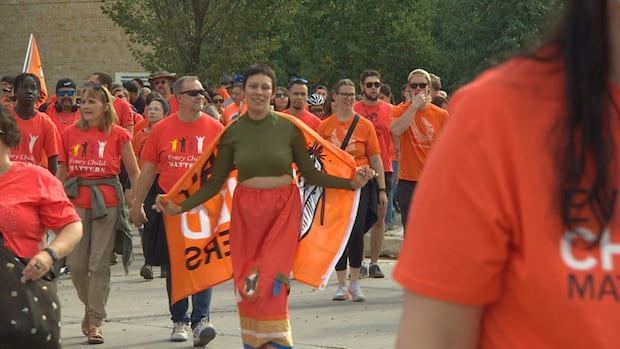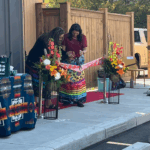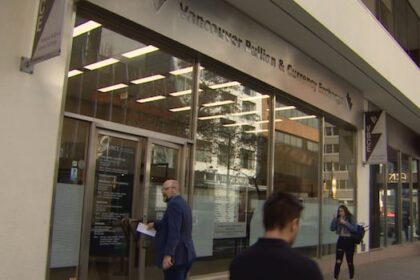ManitobaFor Elder Mary Brian, Orange Shirt Day is about remembering the harms of the past, while also looking optimistically towards the future.Events held in Manitoba commemorated the National Day for Truth and ReconciliationDave Baxter · CBC News · Posted: Sep 30, 2025 7:44 PM EDT | Last Updated: 5 hours agoWinnipeggers showed up in droves to participate in the Southern Chiefs’ Organization’s Orange Shirt Day Healing Walk and Powwow on Tuesday, Sept. 30, 2025. (Rudi Pawlychyn/CBC)For Elder Mary Bryan, Orange Shirt Day is about remembering the harms of the past, while also looking optimistically towards the future. “I’ve been healing over the years,” Bryan said. “I’ve been working on myself to heal, by teaching and telling my story out there, what I went through, and I’m here now seen as an Elder.”I guess I’ve come a long way, but I’m still healing.”Elder Mary Bryan, a day-school and Sixties Scoop survivor originally from Sapotaweyak Cree Nation, said her daughters, granddaughters and great-granddaughters would be walking alongside her in Winnipeg on Tuesday, Sept. 30, 2025. (Rudi Pawlychyn/CBC)Bryan who is originally from the Sapotaweyak Cree Nation in northern Manitoba, was one of thousands who donned orange shirts and walked through the streets of Winnipeg on Tuesday in the fifth annual Orange Shirt Day Healing Walk, organized by the Southern Chiefs’ Organization. As a day school and a Sixties Scoop survivor, Bryan said Orange Shirt Day holds special meaning for her, and she was happy to see so many Indigenous and non-Indigenous people walking together and wearing orange on Tuesday. She added she is seeing more and more non-Indigenous people commemorating Orange Shirt Day each year, and taking time to learn about the harms that were inflicted on children in residential schools, day schools, and during the Sixties Scoop.”Now that the government is listening, everybody is listening,” she said. “I look at it as a positive way, to reconcile with the Indigenous people about what happened, and we start telling the truth about what happened.”Bryan walked on Tuesday with her children, grandchildren, and great-grandchildren, and said it was “very healing” to have multiple generations of her family walk with her, after what she has been through. Tuesday marked the fifth official National Day for Truth and Reconciliation in Canada, also known as Orange Shirt Day, and saw a series of events held across Manitoba memorializing children who were forced to attend residential school, and day schools, as well as those who were taken from their homes and families during the Sixties Scoop. Orange Shirt Day was founded by survivor Phyllis Webstad in 2013. Webstad had an orange shirt gifted by her grandmother confiscated on her first day at a residential school in British Columbia in 1973, when she was just six years old. Sept. 30 was first observed as a provincial statutory holiday last year in Manitoba. “I think that it’s really about changing the narrative in this country,” SCO Grand Chief Jerry Daniels said. “It gives me a lot of hope for the community that we’re recognizing the truth and the history of Canada.Southern Chiefs’ Organization Grand Chief Jerry Daniels attends the SCO’s Orange Shirt Day Healing Walk and Powwow at The Forks in Winnipeg on Tuesday, Sept. 30, 2025. (Rudi Pawlychyn/CBC)”I think the true history needs to be continued to be pushed into the school system,” Daniels added. “And we need to continue to arm teachers and arm our students with the confidence and the truth of where we’ve been, and also that hope of where we need to go in our future.” Matthew Pettigrew, who travelled to Winnipeg from his home in the Elsipogtog First Nation in New Brunswick for Orange Shirt Day, said he knows from his own experience how residential schools harmed generations of Indigenous people in Canada. Matthew Pettigrew from Elsipogtog First Nation in New Brunswick was at the Oodena Circle at The Forks on Tuesday, Sept. 30, 2025, for the Southern Chiefs’ Organization’s Orange Shirt Day Healing Walk and Powwow. (Rudi Pawlychyn/CBC)”All of my family are residential school survivors, I know how it hits,” Pettigrew said. “I see that it’s healing, just very slowly. “People really need to learn a lot more.” Tuesday’s walk also included a pipe ceremony at The Forks before the walk began, and ended at the RBC Convention Centre, where thousands attended a Healing Powwow also put on by SCO.Residential school survivor Nancy Gray, originally from the Sapotaweyak Cree Nation, said it was “fulfilling” to be at Tuesday’s powwow, and see Indigenous culture celebrated, years after residential schools tried to erase that culture.”The little ones that I see dancing, I’m so proud of them,” she said. “In my days I never learned anything like that, when I was in school, they never taught us that.”And I hope they keep it going for the younger generation.”Residential school survivor Nancy Gray, originally from the Sapotaweyak Cree Nation, said it was fulfilling to be at Tuesday’s powwow in Winnipeg, and see Indigenous culture celebrated, years after residential schools tried to erase that culture. (Justin Fraser/CBC)Premier Wab Kinew addressed the crowd at Tuesday’s powwow, and spoke about why he believes the event and other Orange Shirt Day events are so important. “When you dance powwow, you prove that people who started the residential schools failed in their attempt to destroy Indigenous culture,” Kinew said. “Indigenous nations survived so that today we can thrive.”Melissa Wiens said she felt a sense of pride watching her son Zayden Merasty dancing at Tuesday’s powwow, and representing his culture. Melissa Wiens, left, said she felt a sense of pride watching her son Zayden Merasty, right, dancing at Tuesday’s Healing Powwow in Winnipeg. (Justin Fraser/CBC)”I work in schools so I make a big connection with this,” Wiens said. “I think it’s great that my kids get to enjoy stuff like this that I didn’t get to enjoy, that our elders didn’t get to enjoy.”Assiniboia Residential School commemorationTuesday also saw more than 100 people gather near the former site of the Assiniboia Residential School on Academy Road in Winnipeg.Three new plaques were unveiled at the site written in the Anishinaabemowin, Anishininimowin, Cree, Dakota, Dene, English and French languages, to represent languages children who attended the school would have spoken. More than 100 people gather near the former site of the Assiniboia Residential School on Academy Road in Winnipeg where three new plaques were unveiled at the site written in the Anishinaabemowin, Anishininimowin, Cree, Dakota, Dene, English and French languages, to represent languages children at the school would have spoken. (Justin Fraser/CBC)Darian McKinney, a board member with the Assiniboia Residential School Legacy Group, said his personal connection to residential schools has pushed him over the years to learn more about the system and the harms it did. “My grandparents went to residential school, growing up we didn’t really hear a lot about it because they really didn’t want to talk about their stories,” McKinney said. “I wanted to learn more about the impacts of residential schools.”He said he was happy to see people at the ceremony acknowledging the history of residential schools “and the ongoing impacts that affect people like myself that didn’t necessarily go to school, but feel that intergenerational impact.”Darian McKinney, a board member with the Assiniboia Residential School Legacy Group, said his personal connection to residential schools pushed him over the years to learn more about the system and the harms it did. (Justin Fraser/CBC)Ben Carr, the MP for Winnipeg South Centre said after the ceremony, he marvels at how far knowledge of residential schools has come since he was a kid, and he called for continuing education about the schools for future generations.”I grew up just a few blocks from here, and it was a very different time even though it wasn’t that long ago,” Carr said. “Residential school history was not widespread in terms of curriculum in the public school system, and certainly we did not have knowledge of places like this existing in our own backyard.”Manitobans mark Orange Shirt Day in WinnipegEvents across Manitoba memorialized the children who died while attending residential schools and honoured the survivors who were harmed by the system on National Day for Truth and Reconciliation.ABOUT THE AUTHORDave Baxter is an award-winning reporter and editor currently working for CBC Manitoba. Born and raised in Winnipeg, he has also previously reported for the Winnipeg Sun and the Winnipeg Free Press, as well as several rural Manitoba publications.With files from Karen Pauls, Gavin Axelrod and Lauren Scott
Wednesday, 4 Mar 2026
Canada – The Illusion
Search
Have an existing account?
Sign In
© 2022 Foxiz News Network. Ruby Design Company. All Rights Reserved.
You May also Like
- More News:
- history
- Standing Bear Network
- John Gonzalez
- ᐊᔭᐦᑊ ayahp — It happened
- Creation
- Beneath the Water
- Olympic gold medal
- Jim Thorpe
- type O blood
- the bringer of life
- Raven
- Wás’agi
- NoiseCat
- 'Sugarcane'
- The rivers still sing
- ᑲᓂᐸᐏᐟ ᒪᐢᑿ
- ᐅᑳᐤ okâw — We remember
- ᐊᓂᓈᐯᐃᐧᐣ aninâpêwin — Truth
- This is what it means to be human.
- Nokoma











